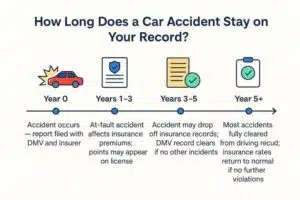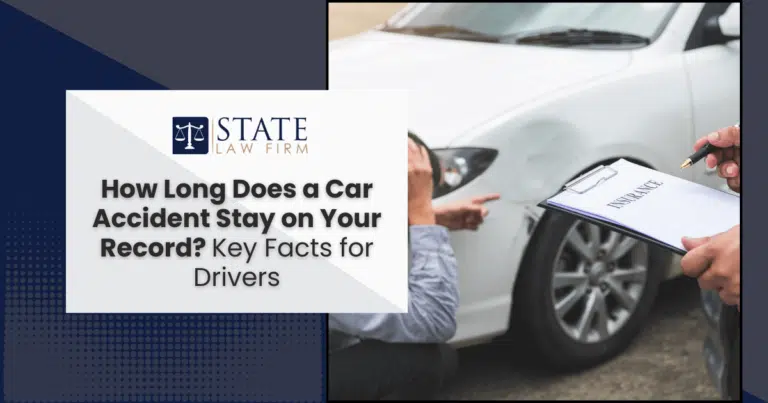Your driving record is more than just a list of past incidents—it’s a key factor that can affect your insurance rates, employment opportunities, and overall financial well-being. For drivers involved in car accidents, understanding how long these incidents remain on your record is crucial for managing potential long-term consequences. Studies show that in the U.S., car accidents account for over 6 million police-reported crashes annually, with varying impacts on insurance and driving records depending on the severity and circumstances of each case (source).
At State Law Firm, we understand how overwhelming it can be to navigate the aftermath of a car accident, especially when your driving history hangs in the balance. As boutique personal injury attorneys based in Sherman Oaks, our team is committed to providing drivers with the information they need to make informed decisions while also fighting for their best possible outcomes. Whether you’re dealing with an accident that wasn’t your fault or trying to mitigate long-term repercussions, we’re here to help you every step of the way.
For more resources on protecting your rights, visit our Sherman Oaks premises liability lawyers page. With this article, we aim to shed light on how car accidents affect your driving record, factors that influence the duration of their impact, and actionable steps you can take to protect your future.
Understanding Your Driving Record: What It Is and Why It Matters
Your driving record is essentially a report card of your time behind the wheel. It’s a detailed log of your motor vehicle history, including traffic violations, accidents, license suspensions, and any points added for infractions. Employers, insurers, and even legal authorities use this document to assess your driving behavior.
Why Your Driving Record Matters
- Insurance Premiums: Insurers rely on your record to calculate your risk profile, directly impacting your rates. A clean record could mean substantial savings.
- Employment Opportunities: Many jobs, especially those involving driving, require a spotless record.
- Legal Consequences: Points or unresolved issues on your record could lead to fines, license suspension, or increased penalties for future infractions.
Pro Tip: Regularly check your driving record to ensure its accuracy. Errors can happen, and disputing them quickly can prevent unnecessary headaches.
For real-life examples of how our team has helped clients navigate accident claims and record disputes, check out our case studies.
The Duration of Car Accident Records: How Long Do They Last?
The length of time a car accident stays on your driving record depends on several factors, including state laws and the nature of the accident. Typically, accidents remain on records for 3 to 7 years, but more severe cases, like DUIs, can stay on for much longer.
Key Factors Influencing Duration
- State-Specific Laws: For example, California typically retains accident records for three years, but insurance companies may consider them for up to ten years.
- Severity of the Accident: Minor fender-benders may not have the same impact as accidents involving serious injuries or fatalities.
- Traffic Violations Tied to the Accident: Violations such as reckless driving or DUI often carry more severe repercussions.
Pro Tip: To understand your specific case, consult an experienced attorney for personalized guidance. Our team at State Law Firm can help you navigate the complexities of California’s driving and insurance laws.
Wondering how a record affects your payout? Learn more about how long an insurance settlement takes after a car accident.

Factors That Influence How Long an Accident Stays on Your Record
Not all accidents are treated equally when it comes to driving records. Several factors determine how long an incident will affect your record:
- Severity of the Accident: Serious accidents with significant damage or injury tend to remain on your record longer.
- Fault Determination: Being at fault can extend the time an accident impacts your record and insurance rates.
- Repeat Offenses: Multiple incidents signal a pattern to insurers and state authorities, potentially leading to harsher consequences.
- Type of Accident: Hit-and-runs, DUIs, or collisions causing property damage typically carry longer durations.
Understanding these factors can help you make strategic decisions about mitigating the impact of an accident on your record.
The Impact of a Car Accident on Insurance Rates: What You Need to Know
A car accident can cause your insurance premiums to spike significantly. Insurers assess your driving history to calculate risk, and a single accident can increase rates by as much as 50% or more.
How Long Do Premium Increases Last?
Insurance rate hikes following an accident typically last 3-5 years, depending on:
- The severity of the accident.
- The fault determination.
- Your history with the insurer.
Mitigating Premium Increases
- Shop Around: Some insurers offer accident forgiveness or more favorable rates for drivers with accident records.
- Maintain a Clean Record: Avoid further infractions to prove your reliability.
- Take Defensive Driving Courses: Completing approved courses can demonstrate responsibility and lower rates.
Still have questions about accident records or insurance impacts? Visit our general FAQs for quick answers and legal guidance.
Steps to Take After a Car Accident to Minimize Record Impact
Taking the proper steps after an accident can significantly reduce the long-term consequences. Here’s what to do:
- Document Everything: Take photos, gather witness information, and file a police report. Proper documentation can help establish facts and minimize liability.
- Report to Your Insurance: Timely reporting ensures compliance with policy terms and can prevent claims denials.
- Seek Legal Advice: An experienced personal injury attorney can guide you through your options, ensuring you’re not unfairly penalized.
- Mitigate Damages: Address vehicle repairs and medical concerns promptly to demonstrate responsibility.
Pro Tip: Contact State Law Firm to discuss your case and determine how to minimize the long-term effects on your record.
Cleansing Your Driving Record: Can You Remove Accidents or Points?
While accidents don’t magically disappear from your driving record, there are ways to improve your standing:
- Defensive Driving Courses: Many states allow you to remove points by completing an approved course.
- Expungement: Some states offer options to expunge minor incidents after a certain period or through court petitions.
- Traffic Violation Dismissals: Successfully contesting a ticket or violation can prevent it from appearing on your record.
- Safe Driving Practices: Maintaining a clean record over time may qualify you for good driver discounts and better insurance rates.
Understanding your record is just one part of the process — see how it connects to insurance settlement timelines and what to expect.
Partner With State Law Firm to Protect Your Future
Whether you’re dealing with an accident or navigating its aftermath, you don’t have to go through it alone. At State Law Firm, we pride ourselves on guiding clients through challenging situations with personalized attention and expert legal support. Contact us today to explore your options and secure the best possible outcome for your case.
By staying informed and proactive, you can minimize the impact of car accidents on your driving record, insurance rates, and overall peace of mind. Let us help you take control of your situation with confidence.
If you’re concerned about an accident hurting your driving record or insurance rates, reach out for a free consultation with our attorneys.
How long does a car accident stay on my driving record?
In most states, a car accident stays on your DMV driving record for about three to five years. Serious violations or multiple at-fault accidents may result in longer suspensions.
How long does an accident affect my insurance rates?
Insurance companies typically increase premiums for three to five years after an at-fault accident. The exact duration depends on your insurer’s policies and your state’s regulations.
What’s the difference between my driving record and my insurance record?
The DMV maintains your driving record, which includes information on traffic violations and accidents. Your insurance record is a claims history that your insurer uses to set rates — it may show incidents even if they don’t appear on your DMV report.
Can I remove an accident from my record sooner?
You generally cannot erase a legitimate accident from your driving record, but you can sometimes dispute incorrect entries or take a defensive driving course to reduce points.
Does a not-at-fault accident show up on my record?
Yes. Many states record all accidents, regardless of fault. However, not-at-fault accidents usually have little to no effect on your insurance premiums.


